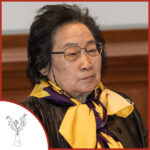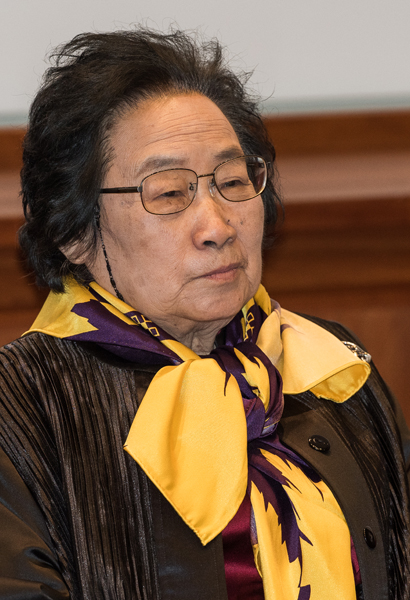

Birth: December 30, 1930
Specialty: Pharmaceutical Chemistry
Major Contributions:
Discovered artemisinin
Synthesized dihydroartemisinin
Nobel Prize in Physiology Medicine
Image Source: Wikimedia Commons (Bengt Nyman, CC BY-SA 4.0)
Globally, the World Health Organization has estimated that between 2000 and 2022 an estimated 2.1 billion malaria cases and millions of malaria deaths were averted due to a variety of efforts including the distribution of the drug artemisinin, discovered in the 1970’s by a team led by Tu YouYou.
In 1967, the Chinese government set up a secret military project to discover new ways to treat malaria. Tu joined Project 523 two years later. Tu, born in 1930, in Ningbo, China attended Peking University Medical School where she studied pharmaceutical science. She also trained for a few years in traditional Chinese medicine. It was this background in traditional medicine that inspired her search for new ways to treat malaria, and in 1969 she had the idea to begin screening Chinese herbs. After testing thousands of traditional recipes, she and her team found qinghao, or Artemisia annua which was described in a fourth century text as a malaria remedy.
In 1977, Tu created an artificial version, dihydroartemisinin, which was more soluble and potent than the native plant compound and provided the basis for the anti-malarial drugs in use today. The WHO calls it an “essential medicine” and it is considered the safest and most fast acting of the available treatments.
For many years, Tu’s discovery went uncredited – her first studies were published anonymously. She later said, “I do not want fame. In our day, no essay was published under the author’s byline.” Researchers at the U.S. National Institutes of Health looked into the history of the drug and the original research notes to find the story of how Tu’s work revolutionized the treatment of malaria.
For her contributions to the discovery of and research into artemisinin, Tu was awarded the 2011 Lasker Award in clinical medicine, the Nobel Prize in Medicine in 2015, The Medal of the Republic in 2019, and was part of Time Magazine’s 100 Women of the Year series in 2020. Still dedicated to her work she is leading a team that is focused on continued research into artemisinin and refining this “best weapon” against malaria.
Written by Mary Ratliff
Sources:
WHO Fact Sheet: World Malaria Report 2023
Nobel Prize goes to modest woman who beat malaria for China (New Scientist)
Nobel Prize Winner Tu Youyou helped by Ancient Chinese Remedy (BBC)
Republic medal laureate: Tu Youyou
Answering an Appeal by Mao Led Tu Youyou, a Chinese Scientist, to a Nobel Prize (Archived)
See Also:
Nobel Prize winner Tu Youyou combed ancient Chinese texts for malaria cure (CNN)
